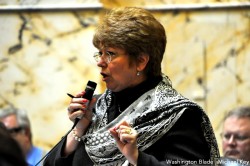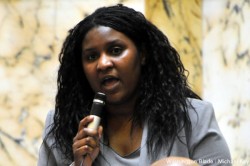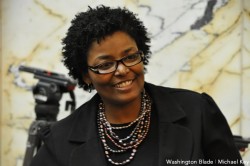Local
BREAKING: MD HOUSE PASSES MARRIAGE
Major hurdle overcome; Senate next to vote
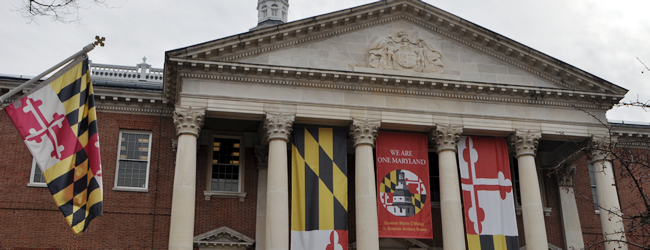
UPDATE: According to Del. Mizeur, Del. John Bohanan also intended to vote for the bill but was not recorded by the voting system. The vote count reflecting that information would be 72-67.
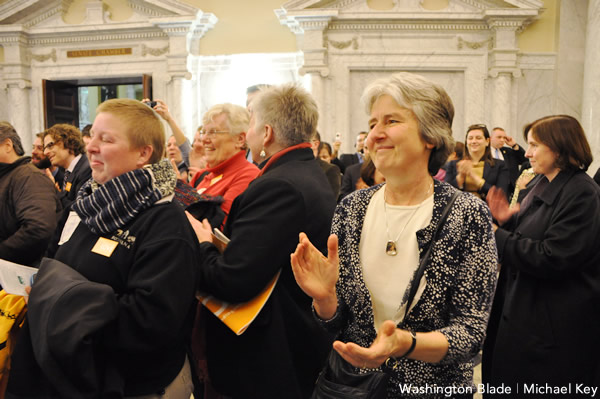
Supporters of same-sex marriage cheer following the passage of the Civil Marriage Protection Act in the Maryland House of Delegates. (Washington Blade photo by Michael Key)
ANNAPOLIS — The Maryland House of Delegates passed a bill to legalize same-sex marriage tonight by a razor-thin margin of 72-67.
Del. Tiffany Alston’s (D-Prince George’s) vote in favor of the bill proved critical to its passage. Del. Sam Arora (D-Mont. Co.), a former supporter of the bill, voted against it.
“Today, the House of Delegates voted for human dignity,” Gov. Martin O’Malley said in a statement. “Speaker Busch and his fellow Delegates deserve a lot of credit for their hard work. At its heart, their vote was a vote for Maryland’s children.”
He continued, “There is still work to be done and marriage equality has not yet been achieved in Maryland. Wherever we happen to stand on the marriage equality issue, we can agree that all our children deserve the opportunity to live in a loving, caring, committed, and stable home, protected equally under the law.”
“We could not be more grateful to the delegates who today voted to make all Maryland families stronger,” said Joe Solmonese, president of the Human Rights Campaign. “Today, we took a giant step toward marriage equality becoming law – and we are in this position due to the unwavering leadership and resolve of Governor O’Malley, Speaker Busch and our legislative allies.”
AN IN DEPTH LOOK AT THE VOTE FROM THE WASHINGTON BLADE
EARLIER: At 2:45 the Maryland House of Delegates adjourned after voting down three amendments to the Civil Marriage Protection Act, while adopting two amendments, one by former marriage foe, Del. Tiffany Alston.
The Alston amendment, supported by many in the LGBT delegation, including Dels. Clippinger, Mizeur, Cullison, and Washington, as well as the bill sponsor, floor leader Del. Dumais — who spoke passionately in favor of same-sex unions throughout the debate — would make clear that the law would not go into effect until all legal challenges to the law, or any referendum process relating to the law, have been exhausted.
The amendment sparked a heated debate between Republicans and Democrats in regard to the power of the amendment to effect the referendum process and the power of the courts in intervening. Minority leader Anthony O’Donnell sought to move to special order on the bill and the amendment for an opinion on the impact from Attorney General Douglas Gansler, tabling the debate on both until Monday. The motion on the special order was handily defeated 55-79, to the chagrin of many.
The Alston amendment — which could signal a shift in support for that delegate — passed easily 81-52, easing the way for those troubled by the bill to feel more comfortable in voting in its favor.
“It was something that could add a level of comfort for some people,” Del. Washington told the Blade. “This is something that we could negotiate on.”
Though the LGBT lawmakers would not comment on whether or not they think that Alston will now support the law, after her surprise vote against in March of 2011, all indicated a hope that she’s come around.
“We believe that she is raising this in good faith,” Del. Cullison told the Blade in regard to Alston’s possible support after passage of her amendment. “And if that’s what makes her comfortable with the bill, knowing that all of the safeguards for the referendum are in place, then I hope she’ll be more comfortable with voting for the entire bill.”
“We hope it makes her feel more comfortable,” Del. Clippinger added.
On Sam Arora, Del. Clippinger hopes that he’s moved back to the side of supporting same-sex marriage, after his surprise rejection of the law in March of 2011.
“I don’t know where he stands right this second,” Del. Clippinger told the Blade. “I don’t know how he’s going to stand until I see a dot on the board.”
“But at the same time, he’s expressed some misgivings, he passed in committee, he asked questions in regard to Del. Alston’s amendment, we certainly hope that if it will help him fell more comfortable maybe that will move him along,” Clippinger added.
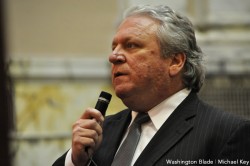
Minority leader, Del. O'Donnell attempted to have Del. Alston's amendment tabled until Monday. (Washington Blade photo by Michael Key)
Del. Arora voted against the Alston amendment.
In 2010 when Sam Arora was campaigning for the House of Delegates, he was able to pull massive amounts of LGBT support and fundraising money as a result of his close ties with gay Democratic activists and his pro-same-sex marriage position, at that time. Many of his former colleagues indicated a feeling of anger and betrayal after his 2011 flip on the issue. Since that vote, Arora has been ambiguous about his stance on the current effort.
Washington County Republican Del. Andrew Serafini proposed an amendment that would push the age of consent for same-sex marriages to 18, rather than allow the same-sex marriages to adhere to the current age of consent laws that allow girls under the age of 16 to marry with parental consent and proof of pregnancy. Supporters of the same-sex marriage bill argued that it may be time to change the age of consent in Maryland, but that there ought not to be differences between same-sex and opposite sex couples, should the bill pass and get signed into law. The amendment failed 54-81.
The delegates also passed on an amendment by Washington County Republican Del. Neil C. Parrott that would allow parents to opt out of allowing their children be exposed to curriculum that they find objectionable in terms of its presentation of same-sex marriage.
“That already is the law,” Montgomery Co. Democrat, Del. Anne Kaiser, argued before the House voted down the amendment 48-73.
Prince George’s Co. Democrat, Del. Aisha Braveboy offered the amendment that same-sex marriage advocates railed hardest against. The amendment would have changed the date the law becomes effective from October 2012 to January 2013, which would prevent marriages from occurring before an expected ballot initiative vote takes place. After impassioned discussion, despite strong opposition, the amendment was passed on a 72-67 vote.
Additionally, a short debate preceded a vote on amending the bill to change the word “marriage” to “civil unions” in the law. After supporters of same-sex marriage presented evidence from around the nation where civil unions were found to be inferior to marriage in offering couples equal protection, the delegates rejected the amendment 45-78.
Yesterday we reported that the Maryland House of Delegates on Thursday put off for at least one day a scheduled debate on legislation to legalize same-sex marriage, leading some to speculate that supporters lack the votes to pass the legislation.
District of Columbia
Judge rescinds order against activist in Capital Pride lawsuit
Darren Pasha accused of stalking organization staff, board members, volunteers

A D.C. Superior Court judge on Feb.18 agreed to rescind his earlier ruling declaring local gay activist Darren Pasha in default for failing to attend a virtual court hearing regarding an anti-stalking lawsuit brought against him by the Capital Pride Alliance, the group that organizes D.C.’s annual Pride events.
The Capital Pride lawsuit, initially filed on Oct. 27, 2025, accuses Pasha of engaging in a year-long “course of conduct” of “harassment, intimidation, threats, manipulation, and coercive behavior” targeting Capital Pride staff, board members, and volunteers.
In his own court filings without retaining an attorney, Pasha has strongly denied the stalking related allegations against him, saying “no credible or admissible evidence has been provided” to show he engaged in any wrongdoing.
Judge Robert D. Okum nevertheless on Feb. 6 approved a temporary stay-away order requiring Pasha to stay at least 100 feet away from Capital Pride’s staff, volunteers, and board members until the time of a follow-up court hearing scheduled for April 17. He reduced the stay-away distance from 200 yards as requested by Capital Pride.
In his two-page order issued on Feb. 18, Okun stated that Pasha explained that he was involved in a scooter accident in which he was injured and his phone was damaged, preventing him from joining the Feb. 6 court hearing.
“Therefore, the court finds there is a good cause for vacating the default,” Okun states in his order.
At the time he initially approved the default order at the Feb. 6 hearing that Pasha didn’t attend, Okun scheduled an April 17 ex parte proof hearing in which Capital Pride could have requested a ruling in its favor seeking a permanent anti-stalking order against Pasha.
In his Feb. 18 ruling rescinding the default order Okun changed the April 17 ex parte proof hearing to an initial scheduling conference hearing in which a decision on the outcome of the case is not likely to happen.
In addition, he agreed to consider Pasha’s call for a jury trial and gave Capital Pride 14 days to contest that request. The Capital Pride lawsuit initially called for a non-jury trial by judge.
One request by Pasha that Okum denied was a call for him to order Capital Pride to stop its staff or volunteers from posting information about the lawsuit on social media. Pasha has said the D.C.-based online blog called DC Homos, which Pasha claims is operated by someone associated with Capital Pride, has been posting articles portraying him in a negative light and subjecting him to highly negative publicity.
“The defendant has not set forth a sufficient basis for the court to restrict the plaintiff’s social media postings, and the court therefore will deny the defendant’s request in his social media praecipe,” Okun states in his order.
A praecipe is a formal written document requesting action by a court.
Pasha called the order a positive development in his favor. He said he plans to file another motion with more information about what he calls the unfair and defamatory reports about him related to the lawsuit by DC Homos, with a call for the judge to reverse his decision not to order Capital Pride to stop social media postings about the lawsuit.
Pasha points to a video interview on the LGBTQ Team Rayceen broadcast, a link to which he sent to the Washington Blade, in which DC Homos operator Jose Romero acknowledged his association with Capital Pride Alliance.
Capital Pride Executive Director Ryan Bos didn’t immediately respond to a message from the Blade asking whether Romero was a volunteer or employee with Capital Pride.
Pasha also said he believes the latest order has the effect of rescinding the temporary stay away order against him approved by Okun in his earlier ruling, even though Okun makes no mention of the stay away order in his latest ruling. Capital Pride attorney Nick Harrison told the Blade the stay away order “remains in full force and effect.”
Harrison said Capital Pride has no further comment on the lawsuit.
District of Columbia
Trans activists arrested outside HHS headquarters in D.C.
Protesters demonstrated directive against gender-affirming care

Authorities on Tuesday arrested 24 activists outside the U.S. Department of Health and Human Services headquarters in D.C.
The Gender Liberation Movement, a national organization that uses direct action, media engagement, and policy advocacy to defend bodily autonomy and self-determination, organized the protest in which more than 50 activists participated. Organizers said the action was a response to changes in federal policy mandated by Executive Order 14187, titled “Protecting Children from Chemical and Surgical Mutilation.”
The order directs federal agencies and programs to work toward “significantly limiting youth access to gender-affirming care nationwide,” according to KFF, a nonpartisan, nonprofit organization that provides independent, fact-based information on national health issues. The executive order also includes claims about gender-affirming care and transgender youth that critics have described as misinformation.
Members of ACT UP NY and ACT UP Pittsburgh also participated in the demonstration, which took place on the final day of the public comment period for proposed federal rules that would restrict access to gender-affirming care.
Demonstrators blocked the building’s main entrance, holding a banner reading “HANDS OFF OUR ‘MONES,” while chanting, “HHS—RFK—TRANS YOUTH ARE NO DEBATE” and “NO HATE—NO FEAR—TRANS YOUTH ARE WELCOME HERE.”
“We want trans youth and their loving families to know that we see them, we cherish them, and we won’t let these attacks go on without a fight,” said GLM co-founder Raquel Willis. “We also want all Americans to understand that Trump, RFK, and their HHS won’t stop at trying to block care for trans youth — they’re coming for trans adults, for those who need treatment from insulin to SSRIs, and all those already failed by a broken health insurance system.”
“It is shameful and intentional that this administration is pitting communities against one another by weaponizing Medicaid funding to strip care from trans youth. This has nothing to do with protecting health and everything to do with political distraction,” added GLM co-founder Eliel Cruz. “They are targeting young people to deflect from their failure to deliver for working families across the country. Instead of restricting care, we should be expanding it. Healthcare is a human right, and it must be accessible to every person — without cost or exception.”

Despite HHS’s efforts to restrict gender-affirming care for trans youth, major medical associations — including the American Medical Association, the American Academy of Pediatrics, and the Endocrine Society — continue to regard such care as evidence-based treatment. Gender-affirming care can include psychotherapy, social support, and, when clinically appropriate, puberty blockers and hormone therapy.
The protest comes amid broader shifts in access to care nationwide.
NYU Langone Health recently announced it will stop providing transition-related medical care to minors and will no longer accept new patients into its Transgender Youth Health Program following President Donald Trump’s January 2025 executive order targeting trans healthcare.
Virginia
Fellow lawmakers praise Adam Ebbin after Va. Senate farewell address
Gay state senator to take job in Spanberger administration

Gay Virginia state Sen. Adam Ebbin (D-Alexandria) delivered his farewell address on Feb. 16 in the Senate chamber in Richmond following his decision to resign from his role as a lawmaker to take a position as senior advisor to Democratic Gov. Abigail Spanberger.
Ebbin, whose resignation was to take effect Feb. 18, received a standing ovation from his fellow senators. Several of them spoke after Ebbin’s address to praise him for his service in the Virginia Senate from 2012 to 2026.
Ebbin first won election to the Virginia House of Delegates in 2003 as the first openly gay member of the General Assembly. He served in the House of Delegates from 2004 to 2012 before winning election to the Senate in 2011.
His Senate district includes Alexandria and parts of Arlington and Fairfax Counties.
“Serving in this body has been the greatest honor of my life,” Ebbin said in his farewell address. “Representing Northern Virginia in the General Assembly — my adopted home since 1989 — has been a responsibility I never took lightly,” he said.
“We are a 406-year-old institution,” he told his fellow lawmakers. “But, when I arrived, I had the distinct honor of being a ‘first’ in the General Assembly,” he said. “Being an openly gay elected official 22 years ago didn’t earn you book deals or talk show appearances — just a seat in a deep minority across the hall.”
Ebbin added, “Still, being out was a fact that felt both deeply personal and unavoidably public. I was proud, but I was also very aware that simply being here carried a responsibility larger than myself.”
Ebbin has been credited with playing a lead role in advocating for LGBTQ rights in the General Assembly as well as speaking out against anti-LGBTQ proposals that have surfaced during his tenure in the legislature.
In his speech he also pointed to other issues he has championed as a lawmaker; including strengthening education programs, expanding access to healthcare, safeguarding the environment, and legislation to help “stand up for working people.”
Among the LGBTQ rights legislation he pushed and mentioned in his speech was the Virginia Values Act of 2020, which bans discrimination based on sexual orientation and gender identity, among other categories.
“I’m particularly proud of our work ensuring Virginia modernized state law to protect LGBT people from discrimination in their daily lives, including in employment, housing, and public accommodations,” he said in his speech. “The Virginia Values Act of 2020 — my proudest achievement — established new protections for all Virginians,” he said.
“This law, the first of its kind in the South, passed with strong bipartisan support,” he stated. “And now — this November — after 20 years, Virginians will finally be able to vote on the Marriage Equality Amendment, which will protect the ability to marry who you love. It’s time for our state constitution to accurately reflect the law of the land.”
He was referring to a proposed state constitutional amendment approved by the General Assembly, but which must now go before voters in a referendum, to repeal a constitutional amendment approved by the legislators and voters in 2006 that bans same-sex marriage.
The U.S. Supreme Court’s Obergefell ruling legalizing same-sex marriage nationwide voided the Virginia same-sex marriage ban. But Ebbin and LGBTQ rights advocates have called on the General Assembly to take action to repeal the amendment in case the Supreme Court changes its ruling on the issue.
In his new job in the Spanberger administration Ebbin will become a senior advisor at the Virginia Cannabis Control Authority, which regulates policies regarding marijuana possession and distribution.
Ebbin was among the lead sponsors of legislation in 2020 to decriminalize possession of marijuana and of current pending legislation calling for legalizing possession.
“When I first entered the General Assembly, I saw too many lives upended by a simple marijuana charge — jobs lost, futures delayed, families hurt,” he said in his speech. “And for far too long, that harm was baked into our laws. That is no longer the case. The times have changed and so have our laws.”
Ebbin said he was also proud to have played some role in the changes in Virginia that now enable LGBTQ Virginians to serve in all levels of the state government “openly, authentically, and unapologetically.”
“I swore to myself that I wouldn’t leave until there was at least one more lesbian or gay General Assembly member,” Ebbin said in his speech. “But when I leave, I’m proud to say we will have an 8-member LGBTQ caucus.”
And he added, “And if anyone on the other side of the aisle wants to come out, you will be more than welcome — we’re still waiting on that first openly gay Republican.”
-

 Baltimore5 days ago
Baltimore5 days ago‘Heated Rivalry’ fandom exposes LGBTQ divide in Baltimore
-

 Real Estate5 days ago
Real Estate5 days agoHome is where the heart is
-

 District of Columbia4 days ago
District of Columbia4 days agoDeon Jones speaks about D.C. Department of Corrections bias lawsuit settlement
-

 European Union4 days ago
European Union4 days agoEuropean Parliament resolution backs ‘full recognition of trans women as women’

